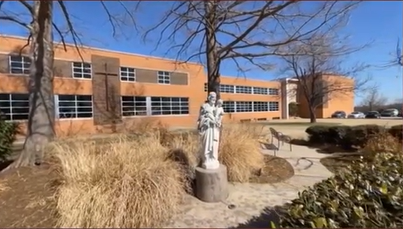
The story: Oklahoma’s top lawyer, who already warned state officials about the constitutionality of a faith-based charter school, has now jumped into the legal fray.
Attorney General Gentner Drummond sued on Friday to block the establishment of St. Isidore of Seville Catholic Virtual Charter School. This marks the second challenge to the proposed K-12 school set to open in 2024.
Going on defense: The news drew a swift response from the National Alliance for Public Charter Schools, which released a statement in support of Drummond’s efforts to “defend public charter schools.”
“We support preserving the original intent and legal status of public charter schools to protect the constitutional rights of the students and teachers who choose these unique public schools. Charter schools are public schools and are state actors for the purposes of protecting students’ federal constitutional rights,” the statement said. The group added that it “vehemently” opposes the Oklahoma board’s approval of the school and pledged to work with partners and advocates to “ensure that all students who wish to attend a high-quality, public school continue to have that option.”
Yes, but: Catholic leaders seeking to open St. Isidore say that it’s needed to reach students in rural areas that lack in-person Catholic schools. Most of the state’s Catholic schools are concentrated in large metro areas. They also want to help traditional Catholic schools by providing access to courses that the traditional school can’t offer.
Why it matters: Charter schools are publicly funded but privately managed and have historically been classified as public schools. That makes them subject to federal requirements to be non-sectarian and comply with anti-discrimination policies. If St. Isidore is allowed to open, it would be the nation’s first religious charter school. It would also throw the doors wide open to efforts in other states to allow religious schools to directly receive taxpayer money.
“Make no mistake, if the Catholic Church were permitted to have a public virtual charter school, a reckoning will follow in which this state will be faced with the unprecedented quandary of processing requests to directly fund all petitioning sectarian groups,” the lawsuit states.
Allegiances fraying: Besides stirring controversy among state GOP leaders, the issue has divided the charter school movement. Great Hearts Academies, a network of 40 classical charter schools in Texas and Arizona, took a position opposite the national alliance in a related case. Great Hearts argued that government funding does not make charter schools state actors. It urged the U.S. Supreme Court to settle the question. The high court declined.
“By design and definition, charter schools are run by independent entities that provide an alternative to government-run education. That independence frees charter schools from bureaucratic and governmental constraints and allows them to offer innovative curricula and environments that government-run schools do not. If charter schools are deemed state actors, that innovation will be stifled,” Great Hearts’ brief said.
Other faith leaders taking notice: Former U.S. Rep. Peter Deutsch, a Florida Democrat who founded a network of secular Hebrew charter schools in 2007, also has been eyeing Oklahoma as fertile ground for a faith-based charter school after the board’s decision.


